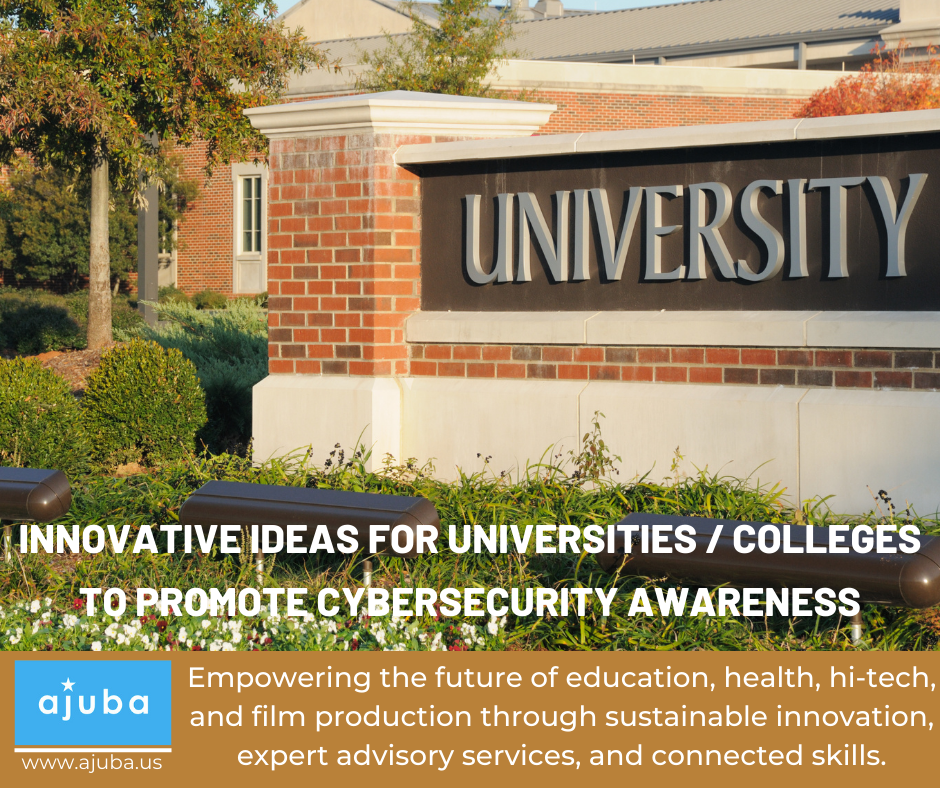Article #20 | October 6th, 2023
In our previous blogs, we explored how organizations and high schools could enhance cybersecurity awareness.
Click here to view the article on 25 Ideas for High Schools to Implement
Click here to view the article on 25 Ideas for Organization to Implement
Continuing on this journey, let’s delve into the innovative ways in which universities / colleges can foster a culture of cybersecurity awareness among their students, faculty, and staff.
Watch Webinar Recording: Creating Cybersecurity Awareness in Your Organization
Guest Speaker: Osvaldo Rivera, Lead Impact Facilitator with ThriveDX
1. Interdisciplinary Maker Spaces
Interdisciplinary maker spaces equipped with cutting-edge technology like 3D printers, robotics kits, cybersecurity, and AR/VR development tools can encourage creativity and innovation. These spaces provide students with the opportunity to explore cybersecurity concepts hands-on.
2. Blockchain-Based Voting
Implementing blockchain-based voting systems for student elections and university governance enhances transparency and security. This technology ensures the integrity of the voting process and bolsters students’ trust in the system.
3. Ethical Hacking and Cybersecurity Challenges
Organizing ethical hacking and cybersecurity competitions allows students to test their skills in a controlled environment. Such events not only inspire healthy competition but also contribute to cybersecurity research.
4. Cybersecurity Workshops and Training Sessions
Conduct regular cybersecurity workshops and training sessions that cover fundamental cybersecurity concepts, safe online practices, and the latest cyber threats. These sessions empower students with practical knowledge.
5. Cybersecurity Awareness Month
Dedicating a month to cybersecurity awareness is an effective strategy. During this period, various activities, seminars, and campaigns can engage students, faculty, and staff. October, known as National Cybersecurity Awareness Month, is an ideal time for such initiatives.
6. Phishing Awareness Campaigns
Running simulated phishing campaigns educates users about the dangers of phishing emails and raises awareness about how to identify and report them. This practical experience strengthens the first line of defense against cyber threats.
7. Guest Speakers and Industry Experts
Inviting cybersecurity experts, industry professionals, and ethical hackers to speak on campus about current cyber threats and share their experiences offers valuable insights. These interactions provide students with real-world perspectives.
8. Cybersecurity Clubs and Student Organizations
Establishing cybersecurity clubs or student organizations where enthusiasts can collaborate, learn, and participate in cybersecurity-related activities fosters a sense of community and shared learning.
9. Secure Coding Workshops
Offering workshops on secure coding practices teaches computer science and engineering students how to develop software with security in mind. This knowledge is invaluable in preventing vulnerabilities in software.
10. Cybersecurity Awareness Posters and Campaigns
Creating engaging posters and campaigns that highlight cybersecurity tips and best practices and placing them in high-traffic areas around campus serves as constant reminders of safe online behavior.
11. Incident Response Drills
Conducting cybersecurity incident response drills and tabletop exercises prepares staff and students for handling security incidents effectively. Practicing responses ensures a swift and organized reaction when needed.
12. Cybersecurity Awareness Badges and Certificates
Developing a cybersecurity awareness program that allows participants to earn badges or certificates as they complete various cybersecurity training modules incentivizes and recognizes their efforts.
13. Virtual Labs for Hands-On Learning
Creating virtual labs where students can safely explore and practice cybersecurity concepts, from penetration testing to digital forensics, offers practical experience in a controlled environment.
14. Online Security Resources
Establishing a dedicated webpage or portal that houses cybersecurity resources, articles, videos, and tools for easy access by students and staff encourages independent learning and research.
15. Reporting Mechanisms
Ensuring there are clear and easily accessible channels for students and staff to report suspicious activities or security incidents promotes a proactive approach to cybersecurity.
16. Gamification of Cybersecurity Training
Gamifying cybersecurity training by creating interactive scenarios and simulations makes learning about security engaging and fun. It encourages active participation and knowledge retention.
17. Cybersecurity Awareness Mobile App
Developing a mobile app that provides cybersecurity news, tips, and resources makes it convenient for students and staff to stay informed and connected to cybersecurity updates.
18. Secure Social Media Practices
Educating students about the risks associated with social media, including privacy settings, oversharing, and recognizing social engineering tactics, ensures safe online interactions.
19. Secure Wi-Fi Initiatives
Launching campaigns to raise awareness about the risks of using public Wi-Fi networks and encourage the use of secure VPNs when connecting to public Wi-Fi protects sensitive data.
20. Cybersecurity Awareness Podcasts
Creating a series of cybersecurity awareness podcasts featuring experts discussing various cybersecurity topics provides an accessible and informative medium for learning.
21. Data Privacy Workshops
Offering workshops on data privacy that cover topics like data protection regulations, personal data security, and responsible data handling prepares students for a data-centric world.
22. Student-Led Cybersecurity Events
Empowering students to organize their own cybersecurity awareness events fosters leadership and engagement within the student body, creating a sense of ownership over cybersecurity.
23. Cybersecurity Awareness Scholarships
Establishing cybersecurity awareness scholarships or contests that reward students for creating and sharing educational cybersecurity content incentivizes them to actively participate.
24. Multi-Factor Authentication (MFA) Promotion
Promoting the use of MFA for securing university accounts and demonstrating how to set up MFA on various platforms and devices enhances account security.
25. Cybersecurity Awareness Ambassadors
Appointing cybersecurity awareness ambassadors among students and staff who actively promote cybersecurity best practices within their departments or peer groups encourages a bottom-up approach to cybersecurity.
These innovative ideas enable universities to build a strong cybersecurity culture, ensuring that students, faculty, and staff are well-prepared to face the evolving cybersecurity challenges of today’s digital world. By fostering cybersecurity awareness at the academic level, universities play a pivotal role in producing a future workforce equipped to defend against cyber threats effectively.

Baljit Singh is an accomplished Founder & CEO with a proven track record in building successful businesses in manufacturing and services companies. With expertise in leadership and general management, Baljit has developed and implemented business strategies, led sales and marketing functions, and built motivated teams in turn-around environments. Author of the Book, “My Experiments with Innovation,” he is a motivational speaker and gives talks on how to cultivate habits and change lifestyle to drive innovation. Baljit is currently driving cross border partnership between India-Israel-North America.
Website: www.ajuba.us
Email: [email protected]
